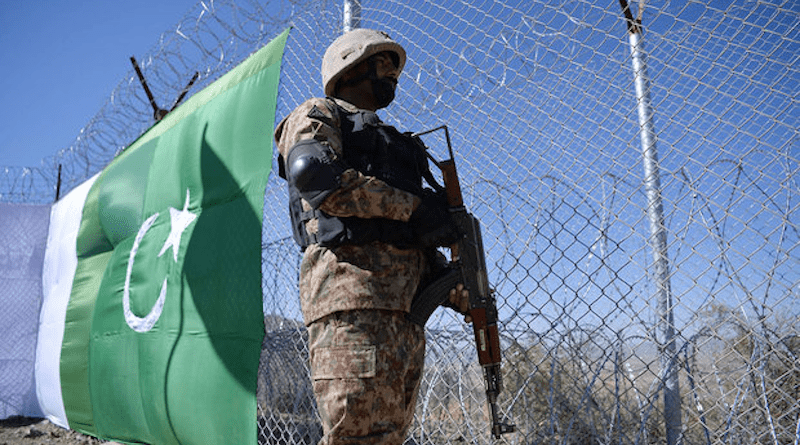Afghan Taliban And TTP Nexus: Negative Effects On Regional Peace – OpEd
By Sehrish Khan
Pakistan and Afghanistan are two major states of South Asia which are bound in cultural, social, religious and historical relationship and are connected to each other by a long border of 2611 km. Pakistan is facing challenges including human trafficking and arrival of terrorists from Pakistan-Afghan border and continuous increase in activities of non-state actors. The Pak-Afghan border is an international border and according to the principle of the International Court of Justice, Afghanistan cannot unilaterally change this border.
The Durand Line Agreement gives Pakistan the legal right to control illegal movement and ensure the security of its people. According to the Safe Fence Act 2006, Pakistan has every right to fence its western border and prevent illegal activities. In view of the current situation, the government of Pakistan has taken many steps to effectively monitor the Pak-Afghan border so that terrorists and elements hostile to the country can be eliminated.
Pakistan’s economic and other crises have boosted the morale of the terrorists who have taken refuge in Afghanistan and they are actively involved in the nefarious campaign along with India to harm Pakistan. The Afghan Taliban and TTP nexus has also had a negative impact on Pak-Afghan relations. Since the establishment of the Taliban government in Afghanistan, terrorism has increased by 60% in Pakistan. During the era of Ashraf Ghani and Hamid Karzai, Afghan soil was used against Pakistan, but it was expected that cross-border terrorism would end under the Taliban government, but the Taliban government released thousands of TTP terrorists including Maulvi Faqir Muhammad who later used American weapons freely against Pakistan. From this, it is not difficult to infer that the TTP and the Afghan Taliban are not only natural allies, there is also an ideological relationship between them.
The outlawed TTP has been more active since the Afghan Taliban came to power in Kabul in August 2021, although 96 percent of Pakistan’s northern areas were cleared of terrorists in military operations and the remaining terrorists fled to Afghanistan. They are now taking advantage of the Taliban regime in Afghanistan. TTP’s links with Afghan Taliban are deeper than other terrorist organizations. The Afghan Taliban government continuously deny it, but now the recent report of the Security Council has supported Pakistan’s position by revealing the relationship between the TTP and the Afghan Taliban.
After 9/11, the resistance of the Taliban and other jihadist groups against the US invasion of Afghanistan continued and in 2007, the TTP was established. Its main leaders were Baitullah Mehsud, Hakimullah Mehsud and Mullah Fazlullah who helped the Afghan Taliban against the US. According to the TTP leadership, their activities are part of the Afghan Taliban’s movement which has extended to Pakistan. The TTP provided safe passage to the Afghan Taliban in Pakistan. A major change in TTP came when it announced its writ in the tribal areas of Pakistan and TTP leader Noor Wali Mehsud started Taliban-style operations there.
Afghan soil has become a paradise for terrorists. Other terrorist organizations including TTP have also been found involved in anti-Pakistan activities. Their attacks have increased by 79% in 2023, which are still continuing this year. There have been many incidents of skirmishes and clashes on Pak-Afghan Torkham and Chaman border. Due to the hostile attitude of the Taliban government, Pakistan strictly adheres to the policy of repatriating Afghan refugees. So far, millions have been sent back.
Pak-Afghan relations can also be explained through Regional Security Complex Theory. The regional security complex theory’s concept of security is not only based on material capabilities but also based on the ideas and actions of the state actors involved, while Afghanistan and Pakistan are clear examples of the regional security complex theory. Factors such as ethnic or religious sentiments, cultural, social and internal interference lead to friendship or enmity between states which ultimately define the regional security complex. In the post-Cold War scenario, the security of the region is constantly threatened by the entry of various external powers into the regional security complex of South Asia. On the other hand, Pakistan expected that the US withdrawal from Afghanistan and the coming to power of the Afghan Taliban would usher in a new era of peace, security and stability in the region, but on the contrary, attacks on security forces in Pakistan, terrorism, especially in Baluchistan, Terrorist activities in Khyber Pakhtunkhwa have dealt a severe blow to the peace process.
Pak-Afghan relations have been subject to constant ups and downs since the beginning. After the establishment of Pakistan in 1947, Afghanistan refused to recognize the new state. Afghanistan always supported India and allowed its territory to be used for Indian operations against Pakistan. Indian consulates were established in Kabul, which were the terrorist training centres of the infamous Indian intelligence agency “RAW”. Narendra Modi has always poisoned the minds of the Afghan leadership, army and intelligence, however, Pakistani leadership since the beginning is trying to ensure peace, security and stability in the region.

